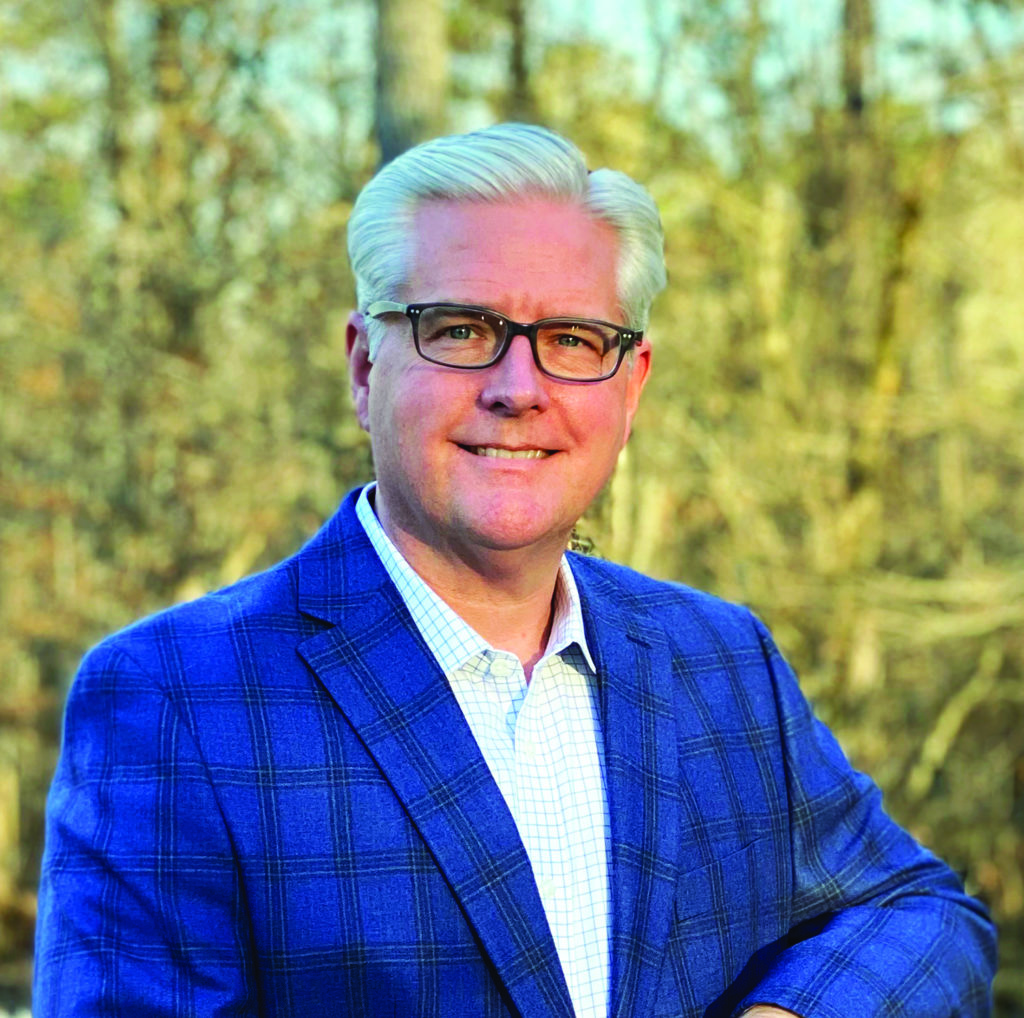Download a digital version of our 2021 Legislative map here.

The Alabama Legislature convenes its 2021 session on Feb. 2, having adjourned last year after the pandemic interrupted business for lawmakers and much of the rest of the country. There had been talk of a special session, but that didn’t materialize, and both the House and Senate head to the state capital this month to tackle a number of important issues. The landscape inside the State House will be different this year, with lawmakers, staff and the public social distancing and observing other safety protocols. AREA’s Vice President for Public Affairs Sean Strickler and Alabama Living Editor Lenore Vickrey talked with incoming Senate Speaker Pro Tempore Greg Reed, R-Jasper, in December for his thoughts on this year’s session.
What do you foresee for the protocols for the Senate as the session opens?
We have a lot to do for the people of the state of Alabama. We had a lot of challenges in the last session in being able to navigate through the coronavirus. We know so much more now about dealing with and managing the virus. At the same time, we all recognize that things are really difficult in the state of Alabama. Our thoughts and prayers are with those dealing with coronavirus and the difficulties it has presented.
Being transparent with what we do for the people is of utmost importance. The general public is going to be allowed to be in our building while we’re doing our work. The media is going to be here, they’re going to be stationed in different locations, in galleries and different places where we’re trying to keep folks safe. The House of Representatives is adopting some new technology to allow them to vote electronically, a requirement for them, and they’re expanding their chamber area. All those things are positives.
There will be things specifically for House employees so they will stay in close communication with their supervisors so they are monitoring their health. You’re going to have temperature checks, screenings, different tools available at entrances to the State House at different levels, like on the seventh floor, recognizing that a lot of work is being done now to make provisions for that.
For the public to be able to access the building is going to be very important, so that everyone is as safe as we can make it during this time.
Also, we move forward, based on what I’m hearing from (State Health Officer) Dr. (Scott) Harris and the Department of Public Health and based on how the vaccines are going to roll out, the situation on Feb. 1 versus the situation on April 1 may be very different. We have to be very cognizant that we are putting together plans that can be modified or strengthened or maneuvered in a different way that allows this to be handled the best way it can be.
It’s an attitude of all hands on deck looking for a way to be as responsive to members, staff and the public as we can be, while keeping in mind having folks safe is a top priority.
With this pandemic, has it shown the glaring deficiencies of the building the legislature meets in?
I don’t think there’s any doubt the building itself is not structured to be able to manage things with the pandemic. The House chamber is a perfect example of those challenges. At the same time, that’s a challenge at church, at school. It’s not ideal, and we’re in uncharted territory. One good thing is that innovation many times is born out of crisis. As we move to the end of this very difficult time, it will be incumbent on all of us to find a very specific methodology as we look backwards, to find what did we do right, what are the things we need to learn. It’s incumbent upon us as time moves forward to be better prepared. Learning from this situation is going to be important for Alabama, period, and certainly for state government.
This pandemic has proved us with our siren call for the need for broadband in rural areas. You’ve been a great proponent of rural broadband, so what do you see for the future as to how we can get more broadband to rural areas?
If you had to categorize the top 5 important issues for the people of Alabama, broadband internet access across our state has to be in that top five list. I think it’s a very important issue as you well know, whether it’s (involving) health care, economic development, industrial growth, manufacturing, or whatever on the economic side, or whether it’s education, our students, whether they’re working on their MBA or they’re in second grade. Having access to the internet and an opportunity to have broadband access that promotes education opportunities is just a huge thing. It impacts every area of our life.
I think we’ve made some strong steps in changing legislation, doing some things statutorily, some things related to grant programs. Because I represent a rural district, I have been focused on how to find ways how public utilities, cooperatives, suppliers of internet service, the Alabama supercomputer system, all hands on deck, how we can work together to find ways to do this. I agree with you we’ve made tremendous progress, but we have a long way to go.
What’s happened in the pandemic has done nothing but magnify the needs we have across our state.
As far as the legislative focus here, you will see and hear that it will continue to be one of the number one topics of interest for the legislature. It’s high on the priority list for Senator (Del) Marsh, who has made it clear it’s a big topic for him. We’ve had great engagement from Senator (Clay) Scofield, who’s going to be the majority leader moving forward. It’s been a priority for him as well as many (other) members. Will it continue to be a big deal? You better know it!
Whatever topics that are helping promote better internet access I’m interested in talking with you about it. As I’ve said before, I’m willing to talk, support and collaborate. If you’re bringing internet access to people in my district, I’m for you.
What are the other main issues the legislature will be dealing with?
There are five big issues:
How does Alabama solve the prison problem; health care delivery; broadband internet access; obviously education, from pre-K to institutions of higher education; and industrial growth, innovation growth, and economic development bringing high-paying jobs for Alabamians.
Rep. Bill Poole and I have been appointed by the governor to the Innovation Commission. The number one goal is finding ways that startups and high tech can find Alabama as a great place to start and grow a business. We have so many opportunities in Alabama with our automotive industry, our aerospace industry with Redstone Arsenal, Marshall Space Flight Center, going to the moon, going to Mars – all that for the northern part of the state.
These types of things, incentive packages, and how do we attract jobs has to be at the top of the list.
With the new Mercedes battery facility being built in Bibb County, that will have a big impact on electric utility industry as we start having electric vehicles out there. What are your thoughts on electric cars and that new industry in Alabama?
A big deal moving forward in innovation and thought in the automotive industry falls into two categories. One, the idea of electric cars, and supporting that moving forward, and two, artificial intelligence, and how that’s going to interact with automotive industry. Auburn University says in 10 to 12 years half of us will not need a driver’s license because our cars will be driving themselves. I find that hard to believe but much of the technology in artificial intelligence and automobiles already exists in cars we drive today. I’m excited about Mercedes, and building those vehicles, powering those vehicles, charging stations. Sen. Gerald Allen is a big proponent of some of the ongoing work being done to promote electric cars and charging stations; there’s going to be federal grants and resources available to allow those charging stations to be located in Alabama and across the country.
What are your goals for the session?
Moving forward, we have to manage some of the challenges as result of coronavirus.
As we look at all the different issues, not only must we focus on issues that affect all of Alabama, but we also must offer opportunities to senators to focus on things important in their own district and to engage on issues important to them. To be honest, we’ve not had a lot of time to do that. We had little opportunity in second quadrennium to do anything but budgets and a few other things. As a result, it’s important we prioritize issues important to all of us.
We’ve got a couple pieces like incentive packages we’re working on with Commerce Department Director (Greg) Canfield and Chairman Poole. Senator Orr’s legislation on liability protection as a result of the coronavirus will be something important. Several senators are focused on making sure we eliminate state taxes from the stimulus resources. I want to be sensitive to all members of the Senate so their voices are heard. Keeping in mind prioritization especially in this session is going to be important, so that we get things done quickly, recognizing that the landscape, hopefully as relates to the virus, gets better and better, week by week.
Talk about the relationship between majority and minority leaders in the Senate. People don’t realize how well you get along.
I have a very good relationship with Sen. Bobby Singleton. We communicate often during the session, many times a day, trying to understand the priorities of his caucus and of my caucus and how we navigate forward. Of course, there’s going to be philosophical differences, vigorous debate, and issues we do not agree on. That’s healthy. Alabama gets a good product as a result of that kind of the debate. That open debate allows us to work well together because everybody’s voice is able to be heard.
I’ve got strong relationships with the minority members. These are quality individuals who make a sacrifice to serve in public life, just like everybody else engaged in public service. They have constituents to represent just like everybody else, whether Republican or Democrat. In the end, we’re going to make good decisions on what is best for Alabama. I know Sen. Marsh and Sen. Singleton feel the same way. We’re going to continue to work together for what’s best for Alabama. I don’t see that changing. We’ve been able to do that based on one thing and that’s relationships. You get to know folks, get to be friends with them, and what’s going on with them and interact with their lives. That’s true no matter where you are. Those attitudes are able to be seen in the Alabama Senate. We’re going to work hard to maintain those relationships in every direction.





